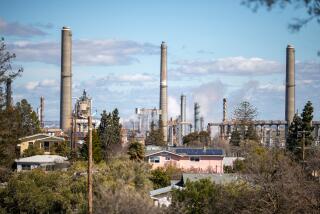Safety lapses caused Bayer blast, report says
- Share via
INSTITUTE, W.VA. — Safety lapses that led to a runaway chemical reaction caused a fatal blast at a Bayer CropScience chemical plant last August, federal investigators said Thursday.
The U.S. Chemical Safety Board’s preliminary report came two days after a congressional inquiry into the Aug. 28 blast that killed two people at the plant west of Charleston, W.Va.
A congressional committee report for that inquiry said the explosion came close to compromising a tank holding methyl isocyanate, or MIC, the chemical that killed thousands in Bhopal, India, when it leaked from a former Union Carbide plant in 1984. Carbide once operated the West Virginia plant, which is now owned by Bayer.
The tank holds about 13,000 pounds of MIC, according to Chemical Safety Board Chairman John Bresland. No other facility in the U.S. stores MIC in such amounts, he said.
Bayer CropScience said in a statement Thursday that it had made improvements since the explosion and that its top priority remained the safety of workers and the community.
The report was unveiled at West Virginia State University, not far from the plant. Residents and local officials expressed frustration with the company’s handling of the blast, and concern about the safety of highly toxic chemicals made and stored there.
The safety board’s investigation is about half over, Bresland said. One outstanding issue remains the fate of thousands of pages of documents Bayer has sought to keep from public release, initially citing a domestic security statute.
In congressional testimony this week, William Buckner, president of Bayer CropScience, said the company’s desire to keep the information secret was motivated partly by security concerns and partly to keep the MIC issue from entering public debate.
“This issue of sensitive security information has basically brought our investigation to a halt in the last 10 weeks,” Bresland said. “I’m deeply disappointed with Bayer’s conduct.”
More to Read
Sign up for Essential California
The most important California stories and recommendations in your inbox every morning.
You may occasionally receive promotional content from the Los Angeles Times.









